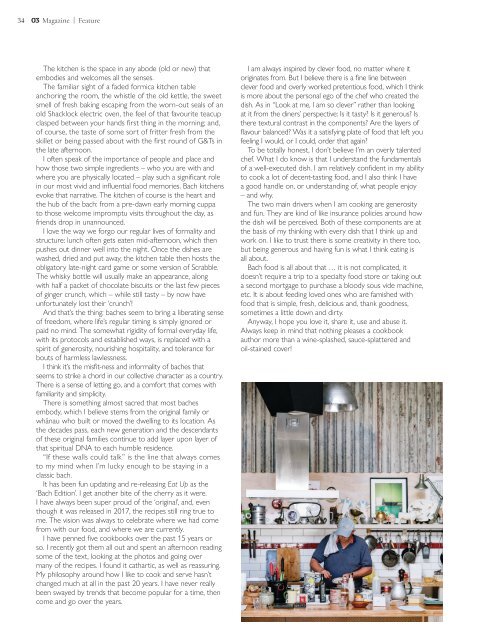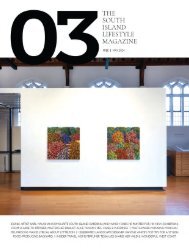03 Magazine: October 02, 2023
You also want an ePaper? Increase the reach of your titles
YUMPU automatically turns print PDFs into web optimized ePapers that Google loves.
34 <strong>Magazine</strong> | Feature<br />
The kitchen is the space in any abode (old or new) that<br />
embodies and welcomes all the senses.<br />
The familiar sight of a faded formica kitchen table<br />
anchoring the room, the whistle of the old kettle, the sweet<br />
smell of fresh baking escaping from the worn-out seals of an<br />
old Shacklock electric oven, the feel of that favourite teacup<br />
clasped between your hands first thing in the morning; and,<br />
of course, the taste of some sort of fritter fresh from the<br />
skillet or being passed about with the first round of G&Ts in<br />
the late afternoon.<br />
I often speak of the importance of people and place and<br />
how those two simple ingredients – who you are with and<br />
where you are physically located – play such a significant role<br />
in our most vivid and influential food memories. Bach kitchens<br />
evoke that narrative. The kitchen of course is the heart and<br />
the hub of the bach: from a pre-dawn early morning cuppa<br />
to those welcome impromptu visits throughout the day, as<br />
friends drop in unannounced.<br />
I love the way we forgo our regular lives of formality and<br />
structure: lunch often gets eaten mid-afternoon, which then<br />
pushes out dinner well into the night. Once the dishes are<br />
washed, dried and put away, the kitchen table then hosts the<br />
obligatory late‐night card game or some version of Scrabble.<br />
The whisky bottle will usually make an appearance, along<br />
with half a packet of chocolate biscuits or the last few pieces<br />
of ginger crunch, which – while still tasty – by now have<br />
unfortunately lost their ‘crunch’!<br />
And that’s the thing: baches seem to bring a liberating sense<br />
of freedom, where life’s regular timing is simply ignored or<br />
paid no mind. The somewhat rigidity of formal everyday life,<br />
with its protocols and established ways, is replaced with a<br />
spirit of generosity, nourishing hospitality, and tolerance for<br />
bouts of harmless lawlessness.<br />
I think it’s the misfit-ness and informality of baches that<br />
seems to strike a chord in our collective character as a country.<br />
There is a sense of letting go, and a comfort that comes with<br />
familiarity and simplicity.<br />
There is something almost sacred that most baches<br />
embody, which I believe stems from the original family or<br />
whānau who built or moved the dwelling to its location. As<br />
the decades pass, each new generation and the descendants<br />
of these original families continue to add layer upon layer of<br />
that spiritual DNA to each humble residence.<br />
“If these walls could talk” is the line that always comes<br />
to my mind when I’m lucky enough to be staying in a<br />
classic bach.<br />
It has been fun updating and re-releasing Eat Up as the<br />
‘Bach Edition’. I get another bite of the cherry as it were.<br />
I have always been super proud of the ‘original’, and, even<br />
though it was released in 2017, the recipes still ring true to<br />
me. The vision was always to celebrate where we had come<br />
from with our food, and where we are currently.<br />
I have penned five cookbooks over the past 15 years or<br />
so. I recently got them all out and spent an afternoon reading<br />
some of the text, looking at the photos and going over<br />
many of the recipes. I found it cathartic, as well as reassuring.<br />
My philosophy around how I like to cook and serve hasn’t<br />
changed much at all in the past 20 years. I have never really<br />
been swayed by trends that become popular for a time, then<br />
come and go over the years.<br />
I am always inspired by clever food, no matter where it<br />
originates from. But I believe there is a fine line between<br />
clever food and overly worked pretentious food, which I think<br />
is more about the personal ego of the chef who created the<br />
dish. As in “Look at me, I am so clever” rather than looking<br />
at it from the diners’ perspective: Is it tasty? Is it generous? Is<br />
there textural contrast in the components? Are the layers of<br />
flavour balanced? Was it a satisfying plate of food that left you<br />
feeling I would, or I could, order that again?<br />
To be totally honest, I don’t believe I’m an overly talented<br />
chef. What I do know is that I understand the fundamentals<br />
of a well-executed dish. I am relatively confident in my ability<br />
to cook a lot of decent-tasting food, and I also think I have<br />
a good handle on, or understanding of, what people enjoy<br />
– and why.<br />
The two main drivers when I am cooking are generosity<br />
and fun. They are kind of like insurance policies around how<br />
the dish will be perceived. Both of these components are at<br />
the basis of my thinking with every dish that I think up and<br />
work on. I like to trust there is some creativity in there too,<br />
but being generous and having fun is what I think eating is<br />
all about.<br />
Bach food is all about that … it is not complicated, it<br />
doesn’t require a trip to a specialty food store or taking out<br />
a second mortgage to purchase a bloody sous vide machine,<br />
etc. It is about feeding loved ones who are famished with<br />
food that is simple, fresh, delicious and, thank goodness,<br />
sometimes a little down and dirty.<br />
Anyway, I hope you love it, share it, use and abuse it.<br />
Always keep in mind that nothing pleases a cookbook<br />
author more than a wine-splashed, sauce-splattered and<br />
oil-stained cover!


















